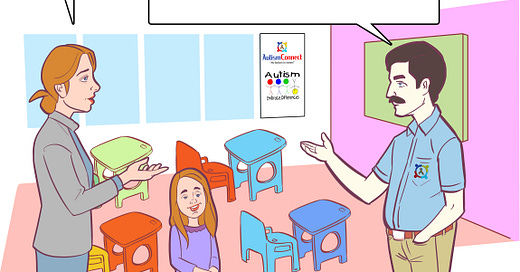Are We Treating Autism Properly?
The evidence supporting applied behavior analysis is flimsy at best
I have a new piece out in City Journal that looks at the recent controversy surrounding Applied Behavioral Analysis (ABA), one of the most common autism treatments. Proponents of ABA have argued that it is evidence-based and improves autistic children’s functioning. Critics say the treatment constitutes a form of abuse and is not backed by solid science. I make the argument that we don’t really know, because it hasn’t been studied well.
Few studies evaluate autistic children’s negative experiences of [ABA], making it hard to conduct an adequate cost-benefit analysis. Those studies that report children making long-term gains in functioning are of middling scientific quality, casting doubt on the therapy’s status as an authoritative treatment. Practitioners and parents swear by the therapy, while many of those who receive it don’t support its use. It’s plausible that ABA is helpful in some cases and harmful in others, but without a commitment to the scientific process and rigorous policy evaluation, we will never be sure whether, and for whom, the therapy works.
One autism researcher came to a similar conclusion as me while writing a report on the evidence for autism treatments, and was harassed by members of the autism care community.
Soon after Whitehouse released his report, numerous clinicians, therapy providers, and professional organizations went after him. They complained to his employer about his research, threatened to sue him, and harassed his family members. Their desire to attack a scientist who exposed the shabbiness of this literature—rather than the generations of scientists who compiled a low-quality body of work—speaks to how little the field today is focused on successfully understanding autism. A whole credentialing apparatus—professional organizations, certification bodies, and college-degree programs—revolves around ABA. As long as parents and the public believe the therapy is scientific, the ABA apparatus can keep profiting.
This looks like a typical case of trying to cancel someone whose research offends you, but in this case the topic of the research is literally whether the treatment we are using on some of society’s most vulnerable people is effective or not. Shouldn’t everyone want to know the truth?
Read the full article here.





I think another question is whether "autism" any longer corresponds to any real identifiable syndrome or condition at all. If you have ever entered this world of autism diagnosis you will find a world of incredibly vague/abstract lists of symptoms, absolutely no physically or biologically grounded means of diagnosis, and extremely subjective interview tests administered by social workers who make judgement calls. I truly don't know what autism is supposed to mean beyond your kid (generally your boy) is weird or difficult. I'm sure ABA as a basically Skinnerian form of indoctrination or training can affect behavior in some way for anyone though.
I've been increasingly curious about what ABA looks like on the ground. I work in a related field, and the solicitations for "Registered Behavior Technicians" are wall-to-wall, far outstripping related roles. The requirements to become an RBT in my state are almost trivial (High school grad, 40 hrs training) especially when measured against the nature and intensity of the therapeutic work expected, and the vulnerability of the population. Having a little familiarity with the concepts behind ABA myself, and knowing how easily behaviorist training can go off the rails in any context, the competency of some RBTs I know is a matter of concern. Undertrained and underprepared people receiving certifications isn't unique to ABA, but ABA does seem like a modality where the skill of the 'practitioner' is paramount, especially in avoiding harm. The horror stories do not surprise me at all.